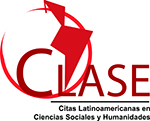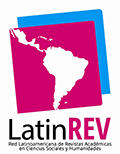Biases in Artificial Intelligence in the Health Sector: A Systematic Review in the Ibero-American Context
DOI:
https://doi.org/10.26422/RIPI.2025.2200.barKeywords:
artificial intelligence, medical care, algorithmic bias, artificial intelligence in health, health biasesAbstract
Artificial Intelligence (AI) has emerged as a transformative tool in the healthcare field, offering the promise of improving diagnostics, optimizing treatments, and promoting more efficient medical care. In the context of the 2030 Agenda for Sustainable Development, the adoption of digital technologies is essential to achieving universal health coverage and protecting communities during health emergencies. However, the expansion of AI in health has raised concerns about the possibility of perpetuating or amplifying pre-existing biases. Research in this field has been dominated by Anglo-Saxon countries, leaving a gap regarding the status of AI in health in Ibero-America. Thus, this article is a systematic review aimed at analyzing the scientific literature on the use and biases of AI in the health sector in Ibero-American and Latin American countries, in order to identify the main areas of application, challenges, and research gaps compared to studies conducted in Anglo-Saxon countries. It also examines the legal and ethical implications of these biases, considering the need to develop regulatory frameworks that protect patients' rights and promote equity in healthcare. Finally, recommendations are proposed for future research and policy development to address data representation and transparency in the use of AI in health, with the goal of mitigating biases and ensuring fair and equitable medical care.
Downloads
References
Aranovich, T. d. C. y Matulionyte, R. (2023). Ensuring AI explainability in healthcare: problems and possible policy solutions. Information & Communications Technology Law, 32(2), 259-275.
Azuaje Pirela, M. (2023). Propiedad intelectual como herramienta para promover la transparencia y prevenir la discriminación algorítmica. Revista Chilena de Derecho y Tecnología, 12, 1-34. https://doi.org/10.5354/0719-2584.2023.70131
Breceda Pérez, J. A. y Castillo Lara, C. (2023). Derecho y ciencia: Entre la dignidad humana y la inteligencia artificial. Ius et Scientia, 9(2), 261-287. https://doi.org/10.12795/IESTSCIENTIA.2023.i02.12
Burlina, P., Joshi, N., Paul, W., Pacheco, K. D. y Bressler, N. M. (2021). Addressing Artificial Intelligence Bias in Retinal Diagnostics. Translational Vision Science y Technology, 10(2), 13-13.
Byrne, M. D. (2021). Reducing Bias in Healthcare Artificial Intelligence. Journal of PeriAnesthesia Nursing, 36(3), 313-316.
Celeste, E. (2022). Digital Constitutionalism: The Role of Internet Bills of Rights. Editorial Milton: Taylor & Francis Group.
Chen, R. J., Wang, J. J., Williamson, D. F. K., Chen, T. Y., Lipkova, J., Lu, M. Y., Sahai, S. y Mahmood, F. (2023). Algorithmic fairness in artificial intelligence for medicine and healthcare. Nature Biomedical Engineering, 7(6), 719-742. https://doi.org/10.1038/s41551-023-01056-8
Cosgrove, L., Karter, J. M., McGinley, M. y Morrill, Z. (2020). Digital Phenotyping and Digital Psychotropic Drugs: Mental Health Surveillance Tools That Threaten Human Rights. Health and Human Rights, 22(2), 33-39.
Cruz Rivero, D. (2024). Disputabilidad y equidad en los mercados digitales: Una visión de Derecho europeo. Revista Chilena de Derecho y Ciencia Política, 15(1), 1-31. https://doi.org/10.7770/rchdcp-v15n1-art393
Davis, S. L. M. y Williams, C. (2020). Enter the cyborgs: Health and human rights in the digital age. Health and Human Rights, 22, 1-6.
Fayos de Arizón, L., Viera, E. R., Pilco, M., Perera, A., De Maeztu, G., Nicolau, A.,… Torra, R. (2023). Artificial intelligence: a new field of knowledge for nephrologists? Clinical Kidney Journal, 16(12), 2314-2326.
García Uribe, J. C. (2021). Propiedad intelectual, patentes y salud: Una mirada desde la bioética. Revista Latinoamericana de Bioética, 21(2), 25-40. https://doi.org/10.18359/rlbi.5076
Garcia-Saiso, S., Marti, M., Pesce, K., Luciani, S., Mujica, O., Hennis, A. y D’Agostino, M. (2024). Artificial intelligence as a potential catalyst to a more equitable cancer care. JMIR Cancer, 10, e57276. https://doi.org/10.2196/57276
García-Gómez, J. M., Blanes-Selva, V. y Doñate-Martínez, A. (2024). Proposing an AI Passport as a Mitigating Action of Risk Associated to Artificial Intelligence in Healthcare. Stud Health Technol Inform, 316, 547-551. https://doi.org/10.3233/shti240472
Johnson, K. B., Wei, W. Q., Weeraratne, D., Frisse, M. E., Misulis, K., Rhee, K., Zhao, J. y Snowdon, J. L. (2021). Precision medicine, AI, and the future of personalized health care. Clinical and Translational Science, 14(1), 86-93. https://doi.org/10.1111/cts.12884
Price, W. N., Gerke, S. y Cohen, I. G. (2022). Liability for use of artificial intelligence in medicine. Law & Economics Working Papers, 241. https://repository.law.umich.edu/law_econ_current/241
Lysaght, T., Lim, H. Y., Xafis, V. y Ngiam, K. Y. (2019). AI-Assisted Decision-making in Healthcare. Asian Bioethics Review, 11(3), 299-314. https://doi.org/10.1007/s41649-019-00096-0
Marques, M., Almeida, A. y Pereira, H. (2024). The Medicine Revolution through Artificial Intelligence: Ethical Challenges of Machine Learning Algorithms in Decision-Making. Cureus, 16(9), e69405. https://doi.org/10.7759/cureus.69405
Martínez Montenegro, I. (2022). La importancia de resetear la cultura sociojurídica: Bases teóricas para la armonización e integración de lineamientos sociojurídicos. Novum Jus, 16(3).
Martínez Montenegro, I. (2023). Sobre los métodos de la investigación jurídica. Revista Chilena de Derecho y Ciencia Política, 14(1), 1-4. https://doi.org/10.7770/rchdcp-v14n1-art312
Martínez Montenegro, I. (2024). Propiedad intelectual y transferencia de tecnología en Chile. Editorial Thomson Reuters.
Mascarenhas, M., Afonso, J., Ribeiro, T., Andrade, P., Cardoso, H. y Macedo, G. (2023). The Promise of Artificial Intelligence in Digestive Healthcare and the Bioethics Challenges It Presents. Medicina (Kaunas), 59(4). https://doi.org/10.3390/medicina59040790
Mascarenhas, M., Martins, M., Ribeiro, T., Afonso, J., Cardoso, P., Mendes, F.,… Macedo, G. (2024). Software as a Medical Device (SaMD) in Digestive Healthcare: Regulatory Challenges and Ethical Implications. Diagnostics (Basel), 14(18), 2100–2116. https://doi.org/10.3390/diagnostics14182100
Minssen, T., Solaiman, B., Wested, J., Köttering, L. y Malik, A. (2024). Governing AI in the European Union: Emerging infrastructures and regulatory ecosystems in health. En Solaiman, B. y Cohen, G. (Eds.), Research handbook on health, AI and the law (pp. 311-331). Edward Elgar Publishing. https://doi.org/10.4337/9781802205657.00027
Nyrup, R. y Cibralic, B. (2024). Idealism, realism, pragmatism: Three modes of theorising within secular AI ethics. En Solaiman, B. y Cohen, G. (Eds.), Research handbook on health, AI and the law (pp. 203-218). Edward Elgar Publishing.
Organización Mundial de la Salud. (2021a). Estrategia mundial sobre salud digital 2020–2025 [Global strategy on digital health 2020–2025]. https://www.who.int/publications/i/item/9789240020924
Organización Mundial de la Salud. (2021b). Ética y gobernanza de la inteligencia artificial para la salud: Orientaciones de la OMS. https://iris.who.int/handle/10665/341996
Page, M. J., McKenzie, J. E., Bossuyt, P. M., Boutron, I., Hoffmann, T. C., Mulrow, C. D., Shamseer, L., Tetzlaff, J. M., Akl, E. A., Brennan, S. E., Chou, R., Glanville, J., Grimshaw, J. M., Hróbjartsson, A., Lalu, M. M., Li, T., Loder, E. W., Mayo-Wilson, E., McDonald, S., McGuinness, L. A., Stewart, L. A., Thomas, J., Tricco, A. C., Welch, V. A., Whiting, P. y Moher, D. (2021). PRISMA 2020 explanation and elaboration: Updated guidance and exemplars for reporting systematic reviews. British Medical Journal, (372), n160. https://doi.org/10.1136/bmj.n160
Paik, K. E., Hicklen, R., Kaggwa, F., Puyat, C. V., Nakayama, L. F., Ong, B. A., Walker, J. D., Shah, S. A., Laviada-Molina, H., Forde, K. A., Na, L., Bascunana, C., Onumah, C., Li, J. y Villanueva, C. (2023). Digital determinants of health: Health data poverty amplifies existing health disparities—A scoping review. PLOS Digital Health, 2(10), e0000313. https://doi.org/10.1371/journal.pdig.0000313
Panadés Zafra, R., Amorós Parramon, N., Albiol-Perarnau, M. y Yuguero Torres, O. (2024). Análisis de retos y dilemas que deberá afrontar la bioética del siglo XXI, en la era de la salud digital. Atención Primaria, 56(7), 102901.
Price II, W. N., Gerke, S. y Cohen, I. G. (2024). Liability for use of artificial intelligence in medicine. En Solaiman, B. y Cohen, I. G. (Eds.), Research handbook on health, AI and the law (pp. 150-166). Edward Elgar Publishing. https://doi.org/10.4337/9781802205657.ch09
Ramón Fernández, F. (2021). Inteligencia artificial en la relación médico paciente: Algunas cuestiones y propuestas de mejora. Revista Chilena de Derecho y Tecnología, 10(1), 329-351.
Reina Reina, A., Barrera, J. M., Valdivieso, B., Gas, M. E., Maté, A. y Trujillo, J. C. (2022). Machine learning model from a Spanish cohort for prediction of SARS-COV-2 mortality risk and critical patients. Scientific Reports, 12(1), 5723. https://doi.org/10.1038/s41598-022-09613-y
Roberts, J. L. y Salib, P. (2024). Algorithmic discrimination and health equity. En Solaiman, B. y Cohen, I. G. (Eds.), Research handbook on health, AI and the law (pp. 93-110). Edward Elgar Publishing.
Rueda, J., Rodríguez, J. D., Jounou, I. P., Hortal-Carmona, J., Ausín, T. y Rodríguez-Arias, D. (2024). “Just” accuracy? Procedural fairness demands explainability in AI-based medical resource allocations. AI & SOCIETY, 39(3), 1411-1422. https://doi.org/10.1007/s00146-022-01614-9
Sai, S., Gaur, A., Sai, R., Chamola, V., Guizani, M. y Rodrigues, J. J. P. C. (2024). Generative AI for Transformative Healthcare: A Comprehensive Study of Emerging Models, Applications, Case Studies, and Limitations. IEEE Access, 12, 31078-31106.
Sekalala, S., Dagron, S., Forman, L. y Meier, B. M. (2020). Analyzing the Human Rights Impact of Increased Digital Public Health Surveillance during the COVID-19 Crisis. Health and Human Rights, 22(2), 7-20.
Smart, S. (26 de agosto de 2024). Algorithmic discrimination in Latin American welfare states. Harvard Kennedy School.
Solaiman, B. (2025). The European Union’s Artificial Intelligence Act and trust: Towards an AI Bill of Rights in healthcare? Law, Innovation and Technology, 17(1), 318-334. https://doi.org/10.1080/17579961.2025.2469986
Solaiman, B. y Cohen, I. G. (2024). A framework for health, AI and the law. En Solaiman, B. y Cohen, I. G. (Eds.), Research handbook on health, AI and the law (pp. 1-19). Edward Elgar Publishing.
Sun, N. N., Esom, K., Dhaliwal, M. y Amon, J. J. (2020). Human Rights and Digital Health Technologies. Health and Human Rights, 22(2), 21-32.
Sánchez Hernández, J. (2024). La necesaria evolución de los derechos humanos: De su metamorfosis clásica hacia la presente encrucijada digital. Revista de Derecho de la UNED, (33), 617-637. https://doi.org/10.5944/rduned.33.2024.41940
Tschider, C. y Ho, C. M. (2024). Artificial Intelligence and Intellectual Property in Healthcare Technologies. En Solaiman, B. y Cohen, G. (Eds.), Research handbook on health, AI and the law (pp. 183-201). Edward Elgar Publishing.
Urueña, R. (2019). Autoridad algorítmica: ¿cómo empezar a pensar la protección de los derechos humanos en la era del “big data”? Latin American Law Review, 1(2), 99-124.
Viniegra-Velázquez, L. (2024). El progreso en medicina y la inteligencia artificial. Boletín Médico del Hospital Infantil de México, 81(3), 121-131. https://doi.org/10.24875/bmhim.24000007
Wilson, R. L., Higgins, O., Atem, J., Donaldson, A. E., Gildberg, F. A., Hooper, M. y Welsh, B. (2023). Artificial intelligence: An eye cast towards the mental health nursing horizon. International Journal of Mental Health Nursing, 32(3), 938-944. https://doi.org/10.1111/inm.13121
Downloads
Published
Issue
Section
License
This license allows the copy, distribution, exhibition and representation of the work provided authorship is acknowledged and the work is properly quoted. Commercial use of the original work or the generation of derived works are not allowed.
The authors hereby guarantee the right to the first publication of the work to the Revista Iberoamericana de la Propiedad Intelectual.











































